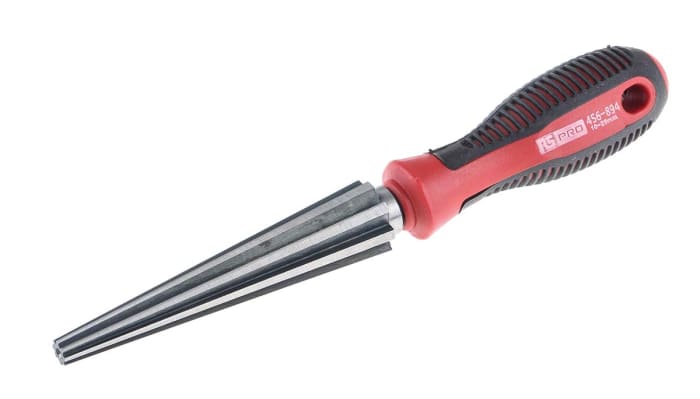RS PRO 10 ⭢ 34mm x 160 mm HSS Hand Reamer

Technical documents
Specifications
Product details
RS PRO HSS Tapered Pipe Reamer
Introducing the RS PRO HSS tapered Pipe Reamer. This high-quality hand tool is essential when cleaning burrs from a drilled hole, or to make a hole bigger. The hand reamer features an ergonomically designed handle for optimum comfort, even when the tool is being used for long periods of time. Designed for ease of use, this RS PRO pipe reamer is an ideal tool for quick, clean reaming and bevelling the inside and outside edges of copper, brass, aluminium and other soft steel tubing.
Features and Benefits:
• The RS PRO hand reamers range are made from heat-treated HSS (High-Speed Steel) for ultra-durability, hardness and premium cutting performance
• The taper head measures from 10mm up to 34mm in taper diameter, making it an ideal hand tool for deburring or chamfering pipes
• Chemically blackened finish for corrosion resistance
• Suitable for use with most soft steel tubing or piping
Applications:
Reaming is a mechanical process that can aid in creating precision holes and is mainly used after the hole has been drilled using a drill bit. Because of this, reamers need to be very strong and have a high tolerance to ensure that the end result is a smooth-cut hole with no sharp internal surfaces. Reamers can be used by hand or machine and are often used in:
• Metalworking industry
• Engineering production
• Automotive and aircraft industries
How does a reamer differ from a drill bit?
A reamer is stiffer and offers a higher tolerance than a drill bit. They are generally made from HSS which means that the reamer also retains much more of its strength and durability even at high temperatures. A reamer also generally comes in pre-determined sizes, just like a drill bit does, but unlike a drill bit, it cannot start a hole, which is the primary function of a drill bit. A drill bit is normally used as the first step in making a hole and a reamer is normally the last step to ensure a clean, burr-free finish with no sharp edges and to ensure the hole is at the correct size.
P.O.A.
1
P.O.A.
Stock information temporarily unavailable.
1
Stock information temporarily unavailable.
Technical documents
Specifications
Product details
RS PRO HSS Tapered Pipe Reamer
Introducing the RS PRO HSS tapered Pipe Reamer. This high-quality hand tool is essential when cleaning burrs from a drilled hole, or to make a hole bigger. The hand reamer features an ergonomically designed handle for optimum comfort, even when the tool is being used for long periods of time. Designed for ease of use, this RS PRO pipe reamer is an ideal tool for quick, clean reaming and bevelling the inside and outside edges of copper, brass, aluminium and other soft steel tubing.
Features and Benefits:
• The RS PRO hand reamers range are made from heat-treated HSS (High-Speed Steel) for ultra-durability, hardness and premium cutting performance
• The taper head measures from 10mm up to 34mm in taper diameter, making it an ideal hand tool for deburring or chamfering pipes
• Chemically blackened finish for corrosion resistance
• Suitable for use with most soft steel tubing or piping
Applications:
Reaming is a mechanical process that can aid in creating precision holes and is mainly used after the hole has been drilled using a drill bit. Because of this, reamers need to be very strong and have a high tolerance to ensure that the end result is a smooth-cut hole with no sharp internal surfaces. Reamers can be used by hand or machine and are often used in:
• Metalworking industry
• Engineering production
• Automotive and aircraft industries
How does a reamer differ from a drill bit?
A reamer is stiffer and offers a higher tolerance than a drill bit. They are generally made from HSS which means that the reamer also retains much more of its strength and durability even at high temperatures. A reamer also generally comes in pre-determined sizes, just like a drill bit does, but unlike a drill bit, it cannot start a hole, which is the primary function of a drill bit. A drill bit is normally used as the first step in making a hole and a reamer is normally the last step to ensure a clean, burr-free finish with no sharp edges and to ensure the hole is at the correct size.

